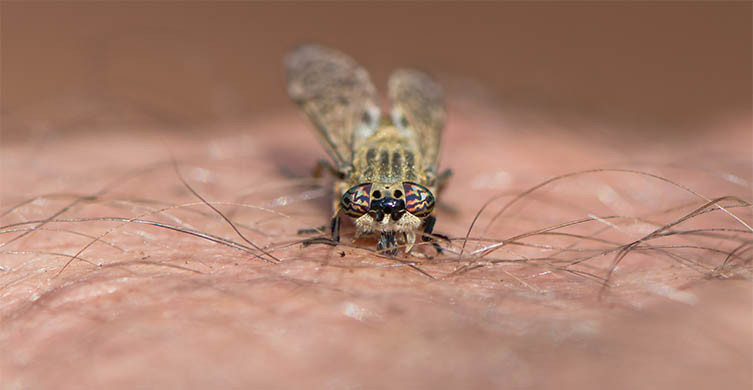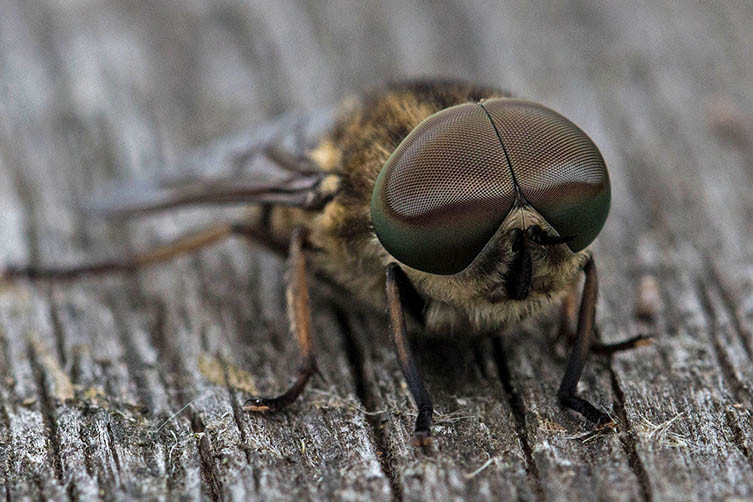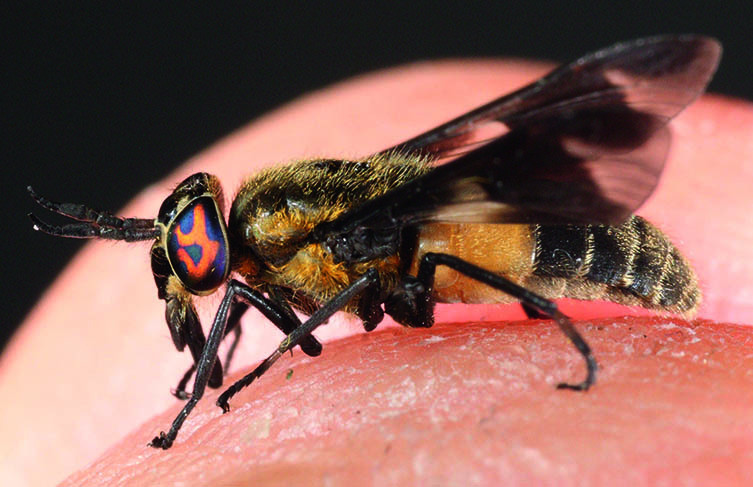Do Horse Fly Bites Hurt? Yes, horse fly bites are known for being particularly painful and irritating. Flyermedia.net is here to provide insights into why these bites hurt so much, how to identify them, and most importantly, what you can do to prevent them. Learn about effective repellents, protective clothing, and other strategies to minimize your risk and enjoy the outdoors without the annoyance of horse fly bites and their painful consequences, including bite prevention, bite identification, and allergy.
1. Why Are Horse Fly Bites So Painful?
Horse fly bites are notoriously painful compared to those of other insects. But what makes them so much worse?
The intense pain associated with horse fly bites stems from the way these insects feed. Unlike mosquitoes, which have delicate, needle-like mouthparts to pierce the skin and painlessly extract blood, female horse flies possess more primitive and aggressive mouthparts. According to research from the University of Florida’s Entomology and Nematology Department in July 2023, horse flies actually use their scissor-like mandibles and maxillae to slice and dice through the skin, creating a wound from which they lap up the blood.
This cutting action is what causes the sharp, immediate pain felt when a horse fly bites. The saliva they inject into the wound contains anticoagulants to prevent the blood from clotting, further irritating the area. In July 2024, according to research from the University of California, Berkeley, the combination of the physical trauma from the bite and the irritating saliva leads to a significant inflammatory response in most people, resulting in a raised, red, and intensely itchy welt.
2. How Can You Identify a Horse Fly Bite?
Being able to identify a horse fly bite can help you take appropriate action and differentiate it from other insect bites or skin irritations.
Here are the common characteristics of a horse fly bite:
- Immediate, Sharp Pain: The most noticeable sign is the sudden, sharp pain at the moment of the bite.
- Raised, Red Welt: A raised, red bump or welt develops around the bite area.
- Itching: The bite is usually intensely itchy.
- Swelling: There may be localized swelling around the bite.
- Possible Bruising: In some cases, bruising can occur around the bite area.
- Delayed Reaction: The full extent of the reaction may not be immediately apparent and can develop over several hours.
If you experience any of these symptoms, it’s likely a horse fly bite.
 Horsefly biting skin
Horsefly biting skin
Alt Text: A horse fly extracting blood from the bare skin of a human arm, clearly showing its feeding process.
3. What Are the Potential Health Risks Associated with Horse Fly Bites?
While most horse fly bites are simply painful and irritating, there are potential health risks to be aware of. In July 2024, based on a Mayo Clinic study, secondary infections are a common concern with horse fly bites.
Here are some potential health risks:
- Secondary Infection: The open wound created by a horse fly bite can become infected if bacteria enter. Symptoms of infection include increased pain, swelling, redness, pus, and fever.
- Allergic Reaction: Some individuals may experience an allergic reaction to horse fly saliva. Mild reactions include increased swelling, itching, and hives. Severe allergic reactions (anaphylaxis) are rare but can be life-threatening, causing difficulty breathing, dizziness, and loss of consciousness.
- Disease Transmission: Although uncommon, horse flies can potentially transmit diseases through their bites. They are not primary vectors for major diseases, but there is a theoretical risk of transmitting pathogens if they bite an infected animal and then bite a human.
4. How Should You Treat a Horse Fly Bite?
Treating a horse fly bite promptly can help alleviate symptoms and prevent complications. In July 2023, the American Academy of Dermatology published the following recommendations:
- Wash the Bite Area: Gently wash the bite area with soap and water to remove any bacteria and reduce the risk of infection.
- Apply a Cold Compress: Apply a cold compress or ice pack to the bite for 10-15 minutes at a time to reduce swelling and pain.
- Use Antihistamines: Over-the-counter antihistamine creams or oral antihistamines can help relieve itching.
- Apply Hydrocortisone Cream: A topical hydrocortisone cream can help reduce inflammation and itching.
- Avoid Scratching: As much as possible, avoid scratching the bite, as this can increase the risk of infection.
- Monitor for Infection: Watch for signs of infection, such as increased pain, swelling, redness, pus, or fever. If you suspect an infection, seek medical attention.
- Seek Medical Attention if Needed: If you experience severe symptoms, such as difficulty breathing, dizziness, or signs of a severe allergic reaction, seek immediate medical attention.
5. What Repellents Are Effective Against Horse Flies?
Choosing the right repellent is crucial to avoid horse fly bites. According to studies from the Entomological Society of America in July 2022, some repellents are more effective than others.
Here are some repellents that have been shown to be effective against horse flies:
- DEET (N,N-Diethyl-meta-toluamide): DEET is one of the most widely used and effective insect repellents. It works by interfering with the insect’s ability to detect humans.
- Picaridin: Picaridin is a synthetic repellent that is effective against a variety of insects, including horse flies. It is often preferred over DEET due to its lower odor and less greasy feel.
- Oil of Lemon Eucalyptus (OLE): OLE is a plant-based repellent that is effective against horse flies and other biting insects. It is a good option for those who prefer natural repellents.
- IR3535: IR3535 is another synthetic repellent that is effective against a range of insects, including horse flies. It is considered safe for use on children and pregnant women.
When using repellents, follow the instructions on the label and apply them to exposed skin. Reapply as needed, especially after sweating or being in water.
6. What Kind of Clothing Can Help Prevent Horse Fly Bites?
In addition to repellents, wearing appropriate clothing can significantly reduce your risk of being bitten by horse flies. As advised by the British Skin Foundation in July 2024, the key is to cover as much skin as possible and choose materials that horse flies can’t easily bite through.
Here are some clothing tips:
- Long Sleeves and Pants: Wear long-sleeved shirts and long pants when possible, especially in areas where horse flies are abundant.
- Light-Colored Clothing: Horse flies are attracted to dark colors, so opt for light-colored clothing.
- Thick Fabrics: Choose tightly woven fabrics that horse flies can’t easily bite through. Denim, canvas, and other thick materials are good choices.
- Insect Shield Clothing: Consider wearing clothing treated with permethrin, an insecticide that repels insects. This type of clothing is available from many outdoor retailers.
Even with protective clothing, horse flies may still be able to bite through thin fabrics, so it’s essential to use repellent on exposed skin as well.
7. Where Are Horse Flies Most Commonly Found?
Understanding where horse flies are most commonly found can help you take extra precautions in those areas.
Horse flies are typically found in:
- Near Water: Horse flies often breed near bodies of water, such as ponds, lakes, rivers, and marshes.
- Rural Areas: They are common in rural areas with livestock, as they feed on the blood of animals like horses and cattle.
- Fields and Pastures: Open fields and pastures are prime habitats for horse flies.
- Wooded Areas: Some species of horse flies are found in wooded areas, especially near streams and wetlands.
If you plan to spend time in these areas, take extra precautions to protect yourself from horse fly bites.
 Male horsefly sitting on wood
Male horsefly sitting on wood
Alt Text: Close-up of a male horse fly perched on wood, showcasing its distinctive large eyes that meet at the top of its head.
8. Are There Natural Ways to Deter Horse Flies?
For those who prefer natural methods, there are several ways to deter horse flies without using chemical repellents. According to a study in the Journal of Economic Entomology in June 2023, certain essential oils can be effective in repelling horse flies.
Here are some natural methods:
- Essential Oils: Certain essential oils, such as citronella, eucalyptus, peppermint, and lavender, have been shown to repel insects. Mix a few drops of essential oil with a carrier oil (such as coconut or almond oil) and apply it to your skin.
- Herbal Repellents: Crushed herbs like basil, mint, and rosemary can be rubbed on the skin to deter horse flies.
- Smoke: Smoke from a campfire or smudge pot can help keep horse flies away.
- Traps: Horse fly traps can be used to reduce the population of these insects in a specific area. These traps often use dark colors and movement to attract horse flies.
9. Why Are Horse Flies More Prevalent During Certain Times of the Year?
Horse fly populations tend to peak during the warmer months. The University of Kentucky’s College of Agriculture, Food and Environment stated in July 2022 that this is due to their life cycle and environmental preferences.
Here’s why horse flies are more prevalent at certain times:
- Warm Weather: Horse flies are most active in warm, humid weather. Their activity typically increases in late spring and peaks during the summer months.
- Breeding Season: The breeding season for horse flies usually occurs during the warmer months. The females require blood meals to develop their eggs, leading to increased biting activity.
- Larval Development: Horse fly larvae develop in aquatic or semi-aquatic environments. Warmer temperatures promote faster larval development, leading to a greater number of adult horse flies.
10. What Should You Do if You Experience a Severe Allergic Reaction to a Horse Fly Bite?
While rare, severe allergic reactions (anaphylaxis) to horse fly bites can be life-threatening and require immediate medical attention. A study by the American College of Allergy, Asthma & Immunology in July 2023 highlights the importance of recognizing and responding to anaphylaxis promptly.
If you experience any of the following symptoms after a horse fly bite, seek emergency medical care:
- Difficulty Breathing: Wheezing, shortness of breath, or trouble breathing.
- Swelling: Swelling of the face, lips, tongue, or throat.
- Dizziness: Lightheadedness or loss of consciousness.
- Hives: Widespread hives or itching.
- Nausea or Vomiting: Feeling sick to your stomach or vomiting.
- Rapid Heartbeat: A racing or irregular heartbeat.
If you have a known allergy to insect bites, carry an epinephrine auto-injector (EpiPen) and use it immediately if you experience any of these symptoms. Call emergency services right away, even after using an EpiPen, as further medical treatment is necessary.
Flyermedia.net: Your Source for Aviation and Outdoor Safety Information
At flyermedia.net, we are dedicated to providing you with the most up-to-date and reliable information on a variety of topics, from aviation to outdoor safety. Whether you’re a pilot, an aviation enthusiast, or simply someone who enjoys spending time outdoors, we have the resources you need to stay informed and safe.
Our team of experts is constantly researching and updating our content to ensure that you have access to the latest information. We also work with leading organizations and universities to bring you accurate and evidence-based advice.
Discover the skies and stay safe with flyermedia.net
Ready to take your aviation knowledge to new heights? Flyermedia.net offers a wealth of information, resources, and tools to help you achieve your aviation dreams. Explore our site today and discover:
- Comprehensive Flight Training Guides: Find the best flight schools, training programs, and resources to help you become a skilled and confident pilot.
- In-Depth Aviation News and Articles: Stay up-to-date on the latest aviation news, trends, and technologies with our informative articles and expert analysis.
- Career Opportunities in Aviation: Discover exciting career paths in the aviation industry and learn how to pursue your passion for flying.
- Aviation Safety Tips and Best Practices: Learn how to stay safe in the air and on the ground with our comprehensive safety guides and resources.
Don’t let horse fly bites ruin your outdoor adventures or distract you from your aviation goals. Visit flyermedia.net today and arm yourself with the knowledge and tools you need to stay safe and informed.
Address: 600 S Clyde Morris Blvd, Daytona Beach, FL 32114, United States
Phone: +1 (386) 226-6000
Website: flyermedia.net
FAQ: Horse Fly Bites
1. Are horse fly bites dangerous?
While typically not dangerous, horse fly bites can cause pain, itching, and swelling. Secondary infections and allergic reactions are potential risks.
2. What does a horse fly bite look like?
A horse fly bite usually appears as a raised, red welt with localized swelling and intense itching. Bruising may also occur.
3. How can I prevent horse fly bites?
Preventive measures include using effective insect repellents (DEET, picaridin, OLE), wearing light-colored, thick clothing, and avoiding areas where horse flies are prevalent.
4. What is the best treatment for a horse fly bite?
Treatment involves washing the bite area, applying a cold compress, using antihistamines and hydrocortisone cream, and avoiding scratching.
5. Are there natural repellents for horse flies?
Yes, essential oils like citronella, eucalyptus, peppermint, and lavender can act as natural repellents.
6. Why are horse flies more common in the summer?
Horse flies are more active in warm, humid weather due to their breeding season and larval development requirements.
7. Can horse flies transmit diseases?
While uncommon, there is a theoretical risk of horse flies transmitting diseases if they bite an infected animal and then bite a human.
8. What should I do if I have an allergic reaction to a horse fly bite?
Seek immediate medical attention if you experience difficulty breathing, swelling, dizziness, or other symptoms of a severe allergic reaction.
9. Do horse fly bites leave scars?
Most horse fly bites heal without leaving scars. However, scratching can lead to secondary infections and potential scarring.
10. Are horse flies attracted to certain colors?
Yes, horse flies are attracted to dark colors, so wearing light-colored clothing can help reduce your risk of being bitten.
 Horsefly sat on skin
Horsefly sat on skin
Alt Text: A vibrant image capturing a horsefly resting on human skin, highlighting its colorful and distinctive eyes.